Sue and Glenn Roff were a Marist Volunteer Couple, both experienced teachers in Australia, who volunteered in 2019 – 2020. They supported the Burmese Migrant Secondary Programme, Australian Catholic University Online Diploma Programme, and the late afternoon Intermediate English Programme. Here is their reflection after they returned to Australia March 2020. [Read more…]
A Marist finds strength in God and in his community
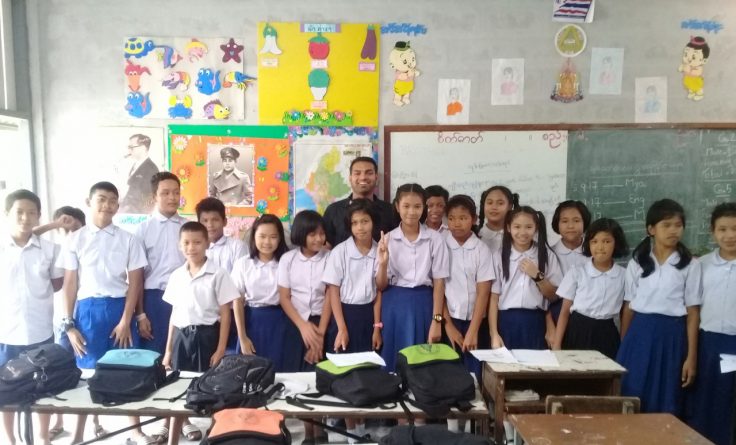 Br Ben is a Marist Seminarian who came to Ranong on his pastoral experience placement while studying to be a Marist Priest in Rome. Marist Asia Foundation enjoys welcoming young Marists for their mission experience each year for 3 months. Below is Br Ben’s volunteer reflection.
Br Ben is a Marist Seminarian who came to Ranong on his pastoral experience placement while studying to be a Marist Priest in Rome. Marist Asia Foundation enjoys welcoming young Marists for their mission experience each year for 3 months. Below is Br Ben’s volunteer reflection.
Before going out for a pastoral experience I always try to balance between getting to know something about the ministry so I know what to expect and at the same time not to have too many expectations as that can negatively affect the experience.
I knew that Ranong was a mission run my Marists on the Thai- Myanmar border that started around 10 years ago and that there had been many Marists and volunteers from all over the world who had worked and are still working there.
I knew that they looked after the needs of AIDS patients and that they had a school where they taught the Migrant children.
But this was only the beginning.
I knew that teaching in a foreign country would have its challenges. Thailand had different education standards, curriculum and different pedagogies. But I soon realised that the main challenge is language.
Teaching English to those who don’t speak it on a regular basis is a challenge as it demands a lot of patience, both from the teachers and the students. At times it was frustrating for me and the students, they wanted to learn and couldn’t and I wanted to teach but couldn’t.
However, at the same time there were some “moments to remember” It was normally when the student or I made a mistake and the class had a giggle. It was normally me and this really strengthened our relationship as we were slowly letting out guard down and letting the other see us for who we really are.
This allowed me to develop my relationship with the students outside the classroom as well. Playing volleyball with the students, talking to them in the hallways,, waving to them around the school and around Ranong helped to get rid of shyness and encourage them to speak freely both inside and outside the classroom .
Working with the health team had its own set of challenges. Each patient had a different story of how they ended up in Ranong.
Some were more heart wrenching than others but they all were victims of social and political injustice and had no means of changing their circumstances without outside help.
This is where the Marist Asia Foundation Health team comes in and assists the patients with a variety of issues based on their needs.
Some needed to get their documents in order before they could be helped by the local health system, while others needed extra health checks, not covered by the system. Others just needed a translator to communicate with the medical staff.
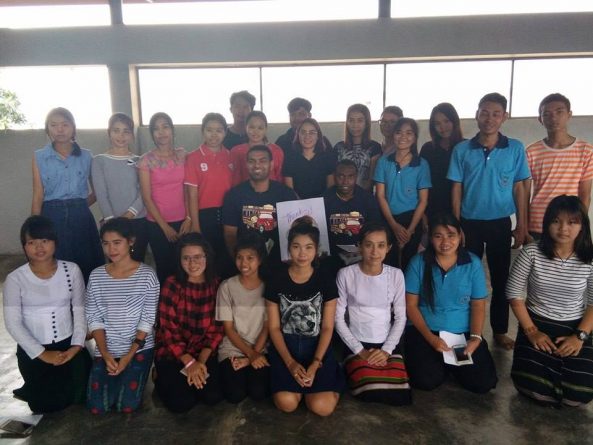
A Marist finds strength in his relationship with God and his community. Ranong would have to be the youngest Marist community that I lived in to date.
With a superior under 50 and all the other members under 50 as well it was a joyful and energetic community. This was strengthened by the community meditation prayer and mass every day.
I’m grateful for my time in Ranong and for all that I learnt during my short stay. I had many experiences I will never forget and each of them will help a different aspect of my formation as a Marist.
I will continue to pray for all those at the Marist Asia Foundation and pray that I see you soon.
I learnt how to love people who are neglected
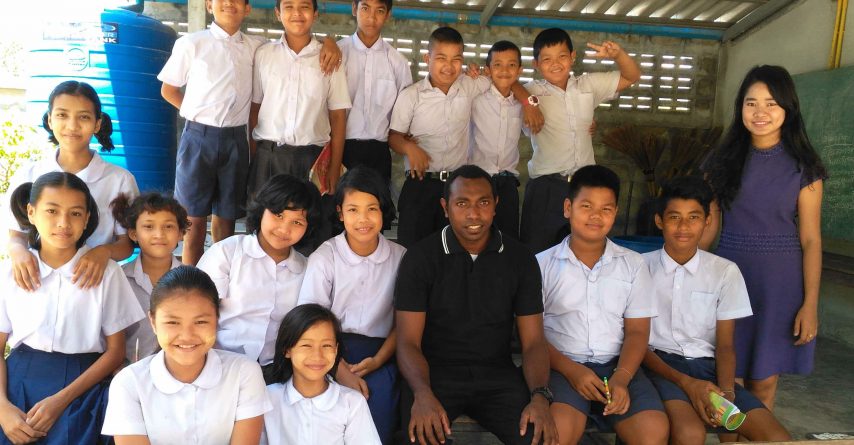 Living in a new culture and environment is always challenging. I am training to be a Marist. I come from Papua New Guinea but have been studying in Rome. I got the opportunity to experience and contribute to the life of the Marist Mission in Ranong.
Living in a new culture and environment is always challenging. I am training to be a Marist. I come from Papua New Guinea but have been studying in Rome. I got the opportunity to experience and contribute to the life of the Marist Mission in Ranong.
The life in Ranong is such a unique place when it comes to dealing with different religions and culture. I was so privileged for being part of the community in Ranong for 3 months. It helped me grow in my human life and my Spiritual growth.
I enjoyed working with education for the Burmese migrants and health outreach to those with HIV. We brought hope in the lives of the people that we worked with.
I had a special teaching experience in the Migrant Learning Centers. They have such joy to receive an education. It was great to be a teacher for them and encourage them to persevere in their life. They actually taught me so much about what life really means. They contributed to my religious formation.
My experience with the health ministry going out visiting sick people with HIV has been one of the unique experiences of my life. It gave me the opportunity to be with them and see them with dignity. I could see our visits brought a smile to their faces.
They formed me to grow in love and respect to every human person. The experience of being with HIV people made me learn how to love people who are neglected by the society. To be like Mary and be a mother to them. I learnt a lot from them.
I wish to thank the community in Ranong and the Marist Theologate in Rome for giving me this opportunity. I will treasure it a lot because it gave me many opportunities to grow in my formation as a Marist.
Thank you very much to the Ranong community for all the support and help you shared with me in my 3 months with you. It was a wonderful experience.
Volunteering – I didn’t miss anything because my life was so full
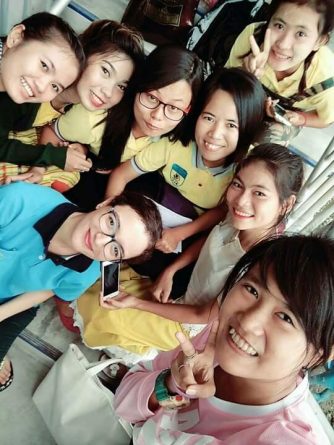 In the summer of 2015 I was very lucky to be selected by Caritas Italiana to take part in a project where they partnered with Marist Asia Foundation to send some of their own volunteers to help in Ranong for a year.
In the summer of 2015 I was very lucky to be selected by Caritas Italiana to take part in a project where they partnered with Marist Asia Foundation to send some of their own volunteers to help in Ranong for a year.
I say “lucky” because I hadn’t even been chosen at the beginning, and was only called back because someone else had given up their spot.
I was obviously very happy and excited, but for reasons that now seem quite unimportant: I enjoyed teaching, Thailand had always been one of my favourite countries to be in, and I had been interested in the plight of the people of Myanmar ever since being introduced to their history by some great professors in university.
So I packed my things and went to Ranong, ready to spend a great year, work hard, and learn interesting things about the people living there.
I didn’t know yet that I would actually find a new home, family, and community.
I loved the school and the students as soon as I met them, and I learned to love Ranong after a few weeks. It is not the prettiest town in Thailand, but it has its own rugged kind of beauty for those who can see.
Or maybe I am just biased because Ranong is now my home and the place where I know I can find some of the people I care about the most, and that makes it beautiful.
Either way, my time here would have been nothing without MAF students and staff. I felt immediately so welcome and so at ease that after just a few months, I knew a single year couldn’t possibly be enough.
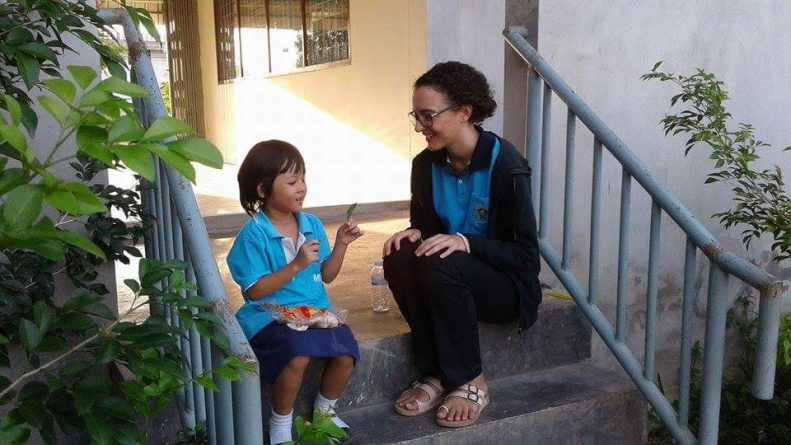 I didn’t want to leave my new home so soon, so after finishing the programme with Caritas Italiana , I came back to Ranong and volunteered with MAF for another 6 months, to finish the school year.
I didn’t want to leave my new home so soon, so after finishing the programme with Caritas Italiana , I came back to Ranong and volunteered with MAF for another 6 months, to finish the school year.
I’m not sure I can explain my feelings fully, but teaching at MAF has been the most fulfilling work I have done so far.
The students are all so sweet and funny, and so open to other people. Their families trust us completely as teachers, and everyone is always happy to say hello (mingalaba) when you are walking around town.
This isn’t to say it’s all peachy all the time: the students are still mostly teenagers, and as much as they value education as a way to improve their lives, they also act like every teenager ever (although that’s a bit comforting to watch, because their lives outside of school are often very far from that of the average Western adolescent, so it’s nice that they can still act silly for a bit — within certain limits……..).
Also the weather can be hard (though the body DOES get used to it after the first few months, just as the nose gets used to the smell from the fish factories).
Good cheese is hard to find (but there’s always fabulous Bangkok one night bus away), and things like electricity, running water, and the internet cant always be taken for granted (although they ARE fine like 80-90% of the time, do not worry).
I swear that almost every single day something unexpected happens and some of the plans for the day go out of the window. But… all of these tiny, mundane inconveniences just make the experience more interesting, and absolutely pale in comparison with the rest.
Inside jokes and nicknames with the students, panicky 10pm texts asking for help with the homework you had explained in detail that same morning, playing with the younger preschoolers, exam answers mentioning something you explained weeks before and was sure everyone had forgotten.
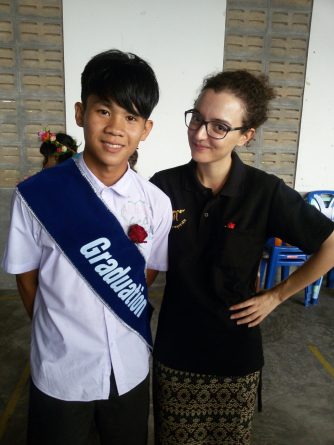 And then there are the lessons spent discussing something that is completely outside of the programne but that the students really want to know about because this is their chance to learn EVERYTHING (Trump’s election, space and galaxies, atomic bombs), birthday parties, sharing snacks and bits of life, learning Burmese songs. Learning everything, in fact.
And then there are the lessons spent discussing something that is completely outside of the programne but that the students really want to know about because this is their chance to learn EVERYTHING (Trump’s election, space and galaxies, atomic bombs), birthday parties, sharing snacks and bits of life, learning Burmese songs. Learning everything, in fact.
I have seen the students’ English improve a lot, so I know I have done “something”, but I also know I have learned more from them, than they from me. How to be patient, how to be curious, how to endure, how to be joyful anyway, how to try again, which app takes the best selfies. All of these things, and more, make it all worth it, and easy.
I didn’t miss anything while I was in Ranong, because my life was so full.
I arrived in Ranong almost by chance, and there I found a new community and life. I still don’t really want to leave now, but I have to. I am already working on ways to come back.
I would really like to thank Caritas Italiana for sending me to Ranong last year, and Marist Asia Foundation for taking me back this year! I was the happiest and luckiest volunteer!
Volunteering – The kids always made me smile
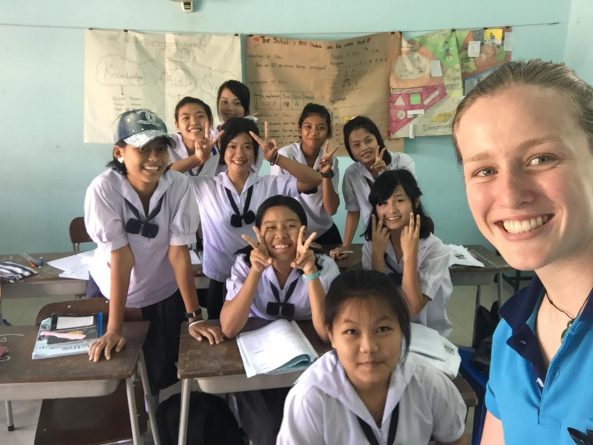 Volunteering at Marist Asia Foundation (MAF) has been a life changing experience.
Volunteering at Marist Asia Foundation (MAF) has been a life changing experience.
I think most people say that about mission work, but I’m really not sure whether the experience has been more beneficial for me or for the students!
Coming from a developed, clean, well-off, temperate country like New Zealand, to a hot, dusty, poor, developing section of the world was the most dramatic change of environment I have ever experienced.
Learning to live in these conditions made me appreciate where I was born and now live; furthermore, the struggle of adapting to the environment, society, and culture also made me empathise with those who have lived this way their entire lives — especially those who do not have the option to leave.
The environment and situation in Ranong certainly contributed to the inspiration I experienced while teaching at MAF. What makes it so inspiring for me is how normal the school is.
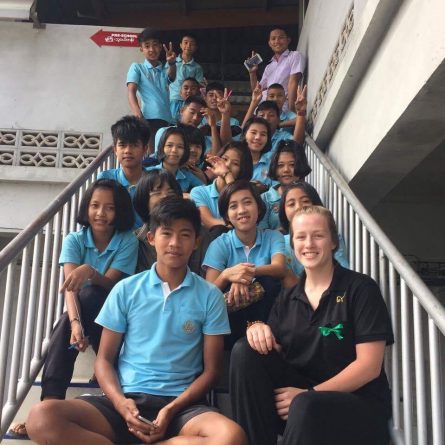 When you are in the classroom, it is like any other. The students make you laugh, smile, and at times want to pull your hair out but they mainly make you proud.
When you are in the classroom, it is like any other. The students make you laugh, smile, and at times want to pull your hair out but they mainly make you proud.
What is extraordinary is the challenges and obstacles that every single student and their family have overcome to gain what is for them a luxury: education.
Not only was I having to adjust to a new country and climate, but I came to the school with no teaching qualifications or experience; this meant a real steep learning curve in the classroom!
One of my favourite things to hear was Fr. Frank’s catch phrase: “No judgement, only encouragement.” I quickly developed a new respect for my teachers and was even a little guilty at the thought of the student I once was for them!
The kids at MAF were great though and they always made me smile. They were always trying to do their best for the teacher and they really cared about the way they are affecting you.
I truly loved every one of them. I remember the students telling me near the end of the school year, “Teacher, you are so cute because even when you tell us off for talking, you always smile straight after.” Clearly not a very effective disciplining tool but they really did always make me smile!
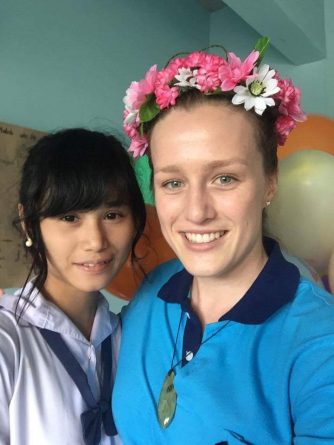 Perhaps because of my lack of teaching skills, the experience I found most enjoyable while volunteering was visiting the HIV patients out in the community with the Health Team. This was really an experience of going out to the people in the most need, visiting them where they were and helping to give them their life back.
Perhaps because of my lack of teaching skills, the experience I found most enjoyable while volunteering was visiting the HIV patients out in the community with the Health Team. This was really an experience of going out to the people in the most need, visiting them where they were and helping to give them their life back.
Through conversations and observing the work of the Health Team, I really understood the unconditional love and care of Christ working through our team for these patients – even though I only visited a couple of times.
Seeing also the gratitude, love, and generosity shining through the gaunt, tired, and pained faces of patients was a strength and gift which I had never seen and will never forget.
I have learnt how to work hard and to be uncomfortable, also of the strength and unbelievable positivity of those whose situations are dire, and have learnt about real poverty and come to realise how blessed we are in New Zealand.
I hope to take the heart of the Marist Fathers, and those in the MAF community, back with me to New Zealand so that I can continue to do all I can to help those who are in most need of our help, and to bring joy to those who seem to have no reason to be joyful.

Volunteering – A day in the life of Ranong
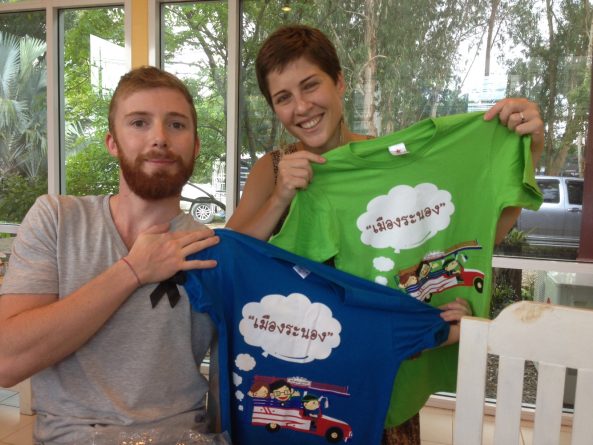
O Ranong! A place not known for its tourist activities, but somehow it has a pull on us. Here’s a typical day for us:
4am Mr. Rooster wakes us. 5am Mr. Rooster again, ahead of schedule. 8am and we’re up and in to the kitchen to make pancakes for breakfast. The neighbourhood kids are outside making a couch and TV set with polystyrene. Boil up some water to make our bath-shower and we’re nearly ready to go. Blue Marist tops on, check. Ponchos, check.
The sun’s peeping out to expose a fresh glimpse of the nearby hills amidst the low cloud that usually blankets the city, what a calm morning. Hi to the family downstairs, throw a leg over the scooter and off. At the intersection the traffic has stopped for a firecracker centred festival, seemingly erupted from nowhere.
We kill the engine, transfixed. Class soon, so better rip our eyes away from i t and find back streets to sneak past the snaking festival. ‘Eww!’, Kristen yells from behind me. Must mean she saw another mangy dog specimen trudging along the sidewalk. We wind past a few heaving, ever-present fish lorries with their morning load from the docks. Slowly brace ourselves for the kamikaze like journey over the potholes on school road. We’re here at MAF.
t and find back streets to sneak past the snaking festival. ‘Eww!’, Kristen yells from behind me. Must mean she saw another mangy dog specimen trudging along the sidewalk. We wind past a few heaving, ever-present fish lorries with their morning load from the docks. Slowly brace ourselves for the kamikaze like journey over the potholes on school road. We’re here at MAF.
English class first. My class is doing revision on ‘will’ and I’ve prepared the day before. I ask about their weekends using some prompts on the whiteboard. Now time to open your books to page 118, class! The lesson races by and as I leave some students hand in extra homework and ask me to mark their voluntarily written essays. Ok, sure!
Time now to prepare for Social Studies class. Human Rights. How do I make this stuff interesting? How do you explain to a Burmese child the concept of having the right to speak freely?! I know, I’ll try a drama.
Lunchtime hurtles round and the girls are getting more involved in volleyball, so good to see. It has started to drizzle and that means one thing. You have 30 seconds until torrential downpour. Quick, ponchos on! Lunch is a quick visit to ‘Thai lady’ for a tasty noodle dish which is reached by a plastic-swamped lane – waste management is low on the list of priorities for people whose kids haven’t ever gone to school. Makes you think.
After eating I’ve got to leave for Ban Maria- the primary learning centre run by the church. Partnering with a brilliant local teacher, we’re trying to get the kids confident in vowel pronunciation. Eventually we make some progress and the students can write the Burmese forms in their book. Success!
Now I’ve got a bit of time so I scoot off to a favourite café, order a coffee, and catch up with the Latvian owner. She’s always full of stories and insights in to the world of Ranong. Back at MAF, it’s the last lesson of the day and my students are going stir-crazy. I let them head upstairs for some more space. It’s great that the management give you the books and resources, explain it, and then let you be creative.
School’s done for the day. The little pre-schoolers file down the steps with their baskets that house their lunches, toothbrushes and other essentials.
With adorably precise haircuts they march up onto the back of the school bus, which is really an overhauled ute with a metal cage on the back and two long seats skirting the sides. ‘Good Morning’, they yell while waving wildy, almost dropping their baskets. It is well into the late afternoon.
After class we relax and debrief each other on our days. Dinner is invariably at our ‘Corner Café’ but our attempts at convincing the staff to make us a ‘mai phet’ (not spicy) Thai salad fail every time. We’ll have three sides of coconut water to wash it down, thanks!
Kristen and Luke were a couple from New Zealand who came for a couple of months and made a tremendous difference. Thanks to you both 🙂
- 1
- 2
- 3
- …
- 6
- Next Page »